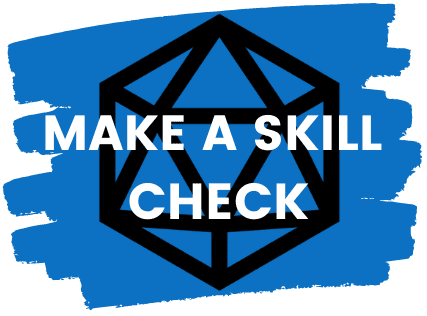On the go? Listen to the audio version of the article here:
It’s D&D night, and Bethrynna’s up next in combat. She casts the concentration spell Witch Bolt on the ogre that stands before her, dealing 1d12 lightning damage. The lightning continues to streak out of her fingertips. On her next turn, Bethrynna can use her action to do another 1d12 damage to the ogre without needing to expend another of her precious few spell slots. How does she get such good mileage from a single spell?
Many spells require concentration to maintain the spell’s effects for its full duration. These spells can end earlier than the full time limit if the caster casts another concentration spell, takes damage, or is incapacitated. But there are ways to overcome these difficulties.
If a caster’s concentration is broken, all the spell’s ongoing effects end. If you are casting spells that require concentration, how can you get the most out of it? Let’s take a look.

Table of Contents
Basics of Concentration Spells
Spells that require concentration are usually powerful.
Many of them last for at least “one minute”, which is ten rounds of combat. This means that you could have one spell slot last an entire encounter if you are able to maintain your concentration.
This is especially useful to consider for classes with limited spell slots, like:
When choosing spells for your character, consider a balance of concentration spells to get the most out of your spell slots. That being said, you also want to avoid having too many concentration spells, since they can only be cast one at a time. Keep an assortment of instantaneous spells so you can mix them in while concentrating.
Therefore, the name of the game is maintaining concentration. If you lose concentration, the spell ends. You can cast it again on your turn, but it’s always better to avoid losing the spell in the first place.
Maintaining Concentration
Have you ever been interrupted while you were focused on a task and lost your train of thought?
Losing concentration on a spell is much like this. It’s being distracted enough that you lose focus on the spell you are casting.
As mentioned, there are three primary ways to break concentration. They are:
- Casting another spell that requires concentration
- Taking damage
- Being incapacitated or killed
There is also a note in the Player’s Handbook that suggests that other environmental phenomena can potentially break your concentration. Though it is hard to plan for when this happens, you will make the same concentration check as you would when taking damage.
Here are some ways that can bolster your character in maintaining concentration.
1. Casting another Spell that Requires Concentration
This one is simple: don’t do it!
Since you cannot concentrate on two spells at the same time, check your spells to see if they require concentration. This is noted in the duration of the spell. Sometimes it might only be denoted with a “c”.

This rule includes most magic items that can cast concentration spells because it is still the user who maintains concentration on the spell unless otherwise specified.
If you are concentrating on a spell, you can cast non-concentration spells with no penalty.
Again, when building your character, be sure not to pick too many concentration spells. Once you cast one, you can’t cast any of the others without spending another slot and ending the first spell.
2. Taking Damage
Taking damage is the most common way to lose concentration as most spells are used in combat.
If you take damage while you are concentrating on a spell, you must make a Constitution saving throw to maintain concentration.
The Difficulty Class (DC) for the concentration check equals 10 or half the damage you take, whichever is higher.
Bethrynna, while concentrating on Witch Bolt, gets hit with an arrow for 9 damage. Half the damage is 4.5, which is less than 10, so she must make a DC 10 Constitution saving throw to maintain concentration.
Later, she gets hit by a dragon’s breath weapon and takes 30 points of damage. Half the damage is 15, which is more than 10, so she must make a DC 15 Constitution saving throw to maintain concentration.
Besides avoiding getting hit, one of the simplest ways to make this check easier is to reduce the damage that you take. Higher AC, damage resistances, buffs, and many other class features help to achieve this.
One note is that Barbarians’ rage ability—a common way of reducing damage—disables you from concentrating on spells at the same time.
If an enemy with multiattack hits you three times in one turn, you must make a Constitution saving throw for each hit separately.
Assuming Constitution is your second or third highest ability score (as it should be), you might only have a +2 to that saving throw. Luckily, there are many ways that you can make it more likely to successfully maintain concentration.
The following and more can be found in the sourcebooks The Player’s Handbook (PHB), Dungeon Master’s Guide (DMG), Xanathar’s Guide to Everything (XGE), and Tasha’s Cauldron of Everything (TCE).
Spells
- Resistance gives you an additional 1d4 to your next saving throw.
- Bless gives you 1d4 to a saving throw. This is more suitable for combat.
- Warding bond gives you +1 to AC and saving throws, and provides resistance to all damage (which means halving all incoming damage).
Class Abilities
- Barbarians, fighters, and sorcerers start with proficiency in Constitution saving throws. If you’re considering multiclassing, remember that you only get the saving throws from your original class — not any of the additional ones. More on multiclassing here.
- The Eldritch Mind warlock invocation grants advantage on the roll (TCE, pg. 71)
- Bladesingers can add their Intelligence modifier to the saving throw (TCE, pg. 77)
- At 3rd level, the rune knight’s Frost Rune adds a +2 when active (TCE, pg. 45)
- Each time you reach a level that allows you an ability score improvement, you could choose to add +2 to your Constitution score, increasing its modifier by one.
- At 6th level, the paladin’s Aura of Protection allows any ally within 10 feet to add the paladin’s charisma modifier (PHB, pg. 85)
- At 6th level, a wizard’s Transmuter Stone grants proficiency. (PHB, pg. 119)
- At 14th level, the monk’s Diamond Soul grants proficiency in all saving throws and can spend a ki point to reroll saving throws (PHB, pg. 79)
- At 20th level, the artificer’s Soul of Artifice allows them to add +1 to every saving throw for each magic item they’re attuned to. At this level, that’s a maximum of +6 (TCE, pg. 14)
Feats
- Resilient allows you to gain a +1 to your Constitution score and become proficient in constitution saving throws.
- War Caster grants advantage to the roll.
- Eldritch Adept grants access to a warlock invocation, so you can technically access Eldritch Mind. However, War Caster is a better option as there are additional benefits.
- Lucky grants three rerolls a day (Super overpowered, some DMs will not allow it).
Magic Items
- Amulet of Health (DMG, pg. 150)
- Astromancy Archive (TCE, pg. 120)
- Belt of Dwarvenkind (DMG, pg. 155)
- Candle of Invocation (DMG, pg. 157)
- Cloak of Protection (DMG, pg. 159)
- Holy Avenger (DMG, pg. 174)
- Luba’s Tarokka of Souls (TCE, pg. 129)
- Luck Blade (DMG, pg. 179)
- Manual of Bodily Health (DMG, pg. 180)
- Fortitude Ioun Stone (DMG, pg. 176)
3. Being Incapacitated or Killed
The most common way of being incapacitated is being reduced to 0 HP. There are certain spells that incapacitate, such as Tasha’s Hideous Laughter, so prepare Counterspell as soon as you can. Although you can be healed almost immediately after you fall unconscious, you will have already lost concentration on the spell.

This is especially useful when maintaining concentration on spells, such as Banishment or Eyebite, where losing concentration is a significant setback.
Fortunately, there are a number of abilities that allow you to drop to 1 HP when reduced to 0 HP and not be killed outright. They are:
- Half-orcs’ Relentless Endurance (PHB, pg. 41)
- 1st level shadow sorcerer’s Strength of the Grave (XGE, pg. 51)
- The 4th level abjuration spell Death Ward (PHB, pg. 230)
- The Gift of the Protectors warlock invocation (TCE, pg. 71)
- The Lifewell Tattoo also grants resistance to necrotic damage (TCE, pg. 129)
- 15th level Oath of the Ancients paladin’s Undying Sentinel (PHB, pg. 87)
- 18th level samurai’s Strength Before Death (XGE, pg. 31)
- 20th level artificer’s Soul of Artifice (TCE, pg. 14)
Because you don’t lose consciousness, you do not lose concentration. You will still need to make a Constitution saving throw from taking damage.
Can You Concentrate on More Than One Spell at a Time?
Most official rules would say no. Generally, the consensus is no. But…
Technically, you can get a Ring of Spell Storing, store a concentration spell, give it to your familiar or teammate, and then they can cast it.
While it’s not technically “you” casting it, they still use all of your skills. The pertinent part of the description is here:
“The spell uses the slot level, spell save DC, spell Attack bonus, and Spellcasting Ability of the original caster”
Concentration checks will still happen if the person using the ring gets hit, but you can effectively have two of your own concentration spells in the mix at the same time.
It’s certainly not nothing.
Looking to challenge your players?
Puzzles and Riddles can be tricky! Too easy and they’re pointless; Too hard and it’s pure frustration. What is a DM to do?
Well, our friends over at Dungeon Vault have an assortment of puzzles, riddles, and tokens to enhance your gaming experience. They even have a murder mystery and a political intrigue system!
For easy-to-use resources for any D&D game, check out the selections at Dungeon Vault!
How to Best Break Concentration
Alright, we’ve covered how to get, maintain, and protect your concentration – but what about when you’re on the receiving end?
There are ways to mess with your opponents, either by causing them to make repeated Constitution Saving Throws to maintain their concentration and/or by decreasing their chance of passing saving throws. Here are some ideas:
- Bestow Curse (Bard, Cleric, Wizard) – a 3rd level necromancy spell, you can get a lot of mileage from it. In this case, you can bestow your target with disadvantage on saving throws and ability checks.
- Heightened Spell (Sorcerer Metamagic) – This metamagic allows gives disadvantage on the save for the spell you just cast. It’s particularly useful for spells that are “save or suck”, like Suggestion. Tell them to be your bodyguard, potentially turning the tide of combat while also breaking their concentration.
- Portent (Divination Wizards) – If you roll mid-to-low for your rolls in the morning and your ally just hit the concentrating enemy, replace their saving throw with your lowest number. Success!
- Eldritch Blast (Warlocks) – Depending on your level, you can get more than one shot at disrupting their concentration. At level 5, 11, and 17, you get additional beams each time you cast it. Though each beam has its own attack roll, chances are at least one should get through.
- Magic Missile (Sorcerer, Wizards) – 3 (or more) auto-hit darts, each forcing a concentration check. As a level 1 spell, it’s the best option on this list. Used in tandem with the first three options in this list, and you’ll be set.
- Scorching Ray (Sorcerer, Wizard) – Another multi-shot attack, for a level 2 spell, it’s not the worst option to make sure you distract your opponent.
- Daggers – We explore daggers more thoroughly in this post, but consult with your DM on how they’d treat using a dagger as a bonus action, either melee or thrown. If they allow you to throw the dagger on the same turn as an attack or spell, then you have yet another chance to disrupt their focus. But regardless, it’s a cheap way to evoke an extra Concentration Check if you’re a melee character at range and don’t want/cant to switch to your bow.
Bottom line: any attack, no matter how weak*, will cause them to make a concentration check. Doing what you can to decrease their chances of maintaining it is worthwhile, depending on the spell they’re maintaining.
*Well, with a minimum of 1 damage. My sorcerer’s -1 strength mod means that his unarmed strikes do 0 damage, even if they land.
Summary

- Concentration spells are ongoing, powerful effects that require the caster’s focus.
- The spell lasts for up to the duration if the caster maintains concentration on the spell.
- Concentration is broken if the caster casts another spell that requires concentration.
- If the caster takes damage, they must make a Constitution saving throw to maintain concentration. The DC is equal to 10 or half the damage taken, whichever is higher, for each attack they take.
- Many racial traits, class features, feats, and magic items grant bonuses to Constitution, saving throws, and specifically Constitution saving throws to maintain concentration.
- Concentration is broken if the caster is incapacitated or killed. This can be mitigated through healing and abilities that allow a PC to drop to 1 HP instead of 0 HP, thereby maintaining concentration.
- You can technically cast two concentration spells at the same time if you put one in a Ring of Spell Storing and give it to a companion.
If you want to build the world’s greatest concentrator, use as many of these abilities as you can—many of them stack on top of each other. Happy rolling!







0 Comments
Trackbacks/Pingbacks